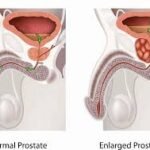


An enlarged prostate, also known as benign prostatic hyperplasia (BPH), is a common condition that affects many men as they age. While it’s not cancerous, it can cause a range of bothersome symptoms that can significantly impact your quality of life. In this comprehensive guide, we will delve into the causes, symptoms, and treatment options for an enlarged prostate enlarged prostate treatment.
Benign Prostatic Hyperplasia (BPH), commonly known as an enlarged prostate, is a prevalent condition affecting men, particularly those over the age of 50. The prostate gland, which surrounds the urethra, can grow larger due to hormonal changes that occur with aging. While BPH is not cancerous and does not increase the risk of prostate cancer, it can lead to uncomfortable urinary symptoms that impact daily life.
The prostate gland, located just below the bladder, plays a crucial role in the reproductive system of men. As men age, the prostate gland often begins to grow, which can lead to BPH. This enlargement can obstruct the urethra, the tube that carries urine out of the body, causing various urinary problems.

The exact cause of BPH is not fully understood, enlarged prostate treatment but several factors are believed to contribute to its development:
Aging: The most significant risk factor for BPH is age. The likelihood of developing BPH increases as men get older.
Hormonal Changes: Changes in hormone levels, particularly a decrease in testosterone and an increase in dihydrotestosterone (DHT), can contribute to prostate growth.
Genetics: A family history of BPH can increase your risk of developing the condition.
The symptoms of BPH can vary from mild to severe and may include:
Frequent Urination: You may need to urinate more often, both during the day and at night.
Urgent Need to Urinate: You may feel a sudden, strong urge to urinate, making it difficult to delay going to the bathroom.
Weak Urine Flow: The stream of urine may be weak or slow.
Difficulty Starting Urination: You may have trouble starting or stopping the urine flow.
Incomplete Bladder Emptying: You may feel like you haven’t fully emptied your bladder after urinating.
Nocturia: You may wake up multiple times during enlarged prostate treatment the night to urinate.
Urinary Retention: In severe cases, you may be unable to urinate at all.
<p><h2><strong>Treatment Options for Enlarged Prostate:
When it comes to managing BPH, several treatment options are available, ranging from lifestyle modifications to medications and surgical interventions These adjustments can help alleviate some symptoms without the need for medication or surgery.
Treatment Options for BPH
The treatment for BPH will depend on the severity of your symptoms and your overall health. Here are some common treatment options:
Watchful Waiting: For mild symptoms, your doctor may recommend a “watchful waiting” approach, monitoring your condition and addressing any changes as needed.
Lifestyle Changes: Certain lifestyle modifications can help manage BPH symptoms, such as:
Drinking Plenty of Fluids: Staying hydrated can help prevent urinary retention.
Limiting Caffeine and Alcohol: These substances can irritate the bladder.
Avoiding Bladder Irritants: Spicy foods and certain medications can worsen symptoms.
Maintaining a Healthy Weight: Obesity can worsen BPH symptoms.
Medications: Several medications can help relieve BPH symptoms, including:
Alpha-Blockers: These medications relax the muscles in the prostate and bladder neck, improving urine flow.
Alpha Reductase Inhibitors: These medications shrink the prostate gland by blocking the production of DHT.
Minimally Invasive Procedures: For more severe symptoms, minimally invasive procedures may be recommended, such as:
Transurethral Resection of the Prostate (TURP): This procedure uses a special instrument inserted through the urethra to remove excess prostate tissue.
Laser Therapy: Laser energy is used to remove or destroy excess prostate tissu

e.
Water Vapor Therapy: Water vapor is used to remove excess prostate tissue.
Prostate Artery Embolization (PAE): This procedure involves blocking the blood supply to the
For men who do not respond to medication or have severe symptoms, surgical options may be considered. Some common procedures include:
Transurethral Resection of the Prostate (TURP): This is one of the most common surgeries for BPH. It involves removing excess prostate tissue through the urethra.
Laser Therapy: High-energy lasers can destroy or remove overgrown prostate tissue with minimal bleeding and quicker recovery times.
Prostate Lift: This minimally invasive procedure uses special implants to hold enlarged prostate tissue out of the way without removing any tissue.
Each surgical option has its own risks and benefits, enlarged prostate treatment which should be discussed with a healthcare provider[4][7][10].
The choice of medication often depends on individual patient factors, including the severity of symptoms and prostate size. Generally, **5-alpha reductase inhibitors**, specifically **finasteride** and **dutasteride**, are considered effective for reducing prostate size in men with significant enlargement. They not only alleviate urinary symptoms but also lower the risk of complications associated with BPH[2][8] For immediate symptom relief, alpha blockers like **tamsulosin** are frequently prescribed due to their rapid action in relaxing bladder muscles[1][5].
dications help shrink the prostate by blocking the hormone responsible for prostate growth. The most common 5-alpha reductase inhibitors are:
What is the main cause of prostate enlargement?
The exact cause of BPH is not fully understood, but several factors are believed to contribute to its development, including aging, hormonal changes, and genetics.

Q: What is an enlarged prostate? A: An enlarged prostate, also known as benign prostatic hyperplasia (BPH), is a common condition in older men where the prostate gland grows larger than normal.
Q: Can an enlarged prostate lead to prostate cancer? A: While both conditions affect the prostate, they are different. An enlarged prostate is not cancerous. However, regular check-ups are important to monitor for any signs of cancer.
Q: How can I prevent an enlarged prostate? A: While there’s no guaranteed way to prevent BPH, maintaining a healthy lifestyle, including a balanced diet, regular exercise, and stress management, may help reduce the risk.
Managing an enlarged prostate involves understanding the condition and exploring various treatment options tailored to individual needs. While lifestyle changes can be beneficial for mild cases, medications such as alpha blockers and 5-alpha reductase inhibitors play a crucial role in alleviating symptoms for many men. For those with more severe symptoms or complications, surgical interventions may provide lasting relief enlarged prostate treatment.